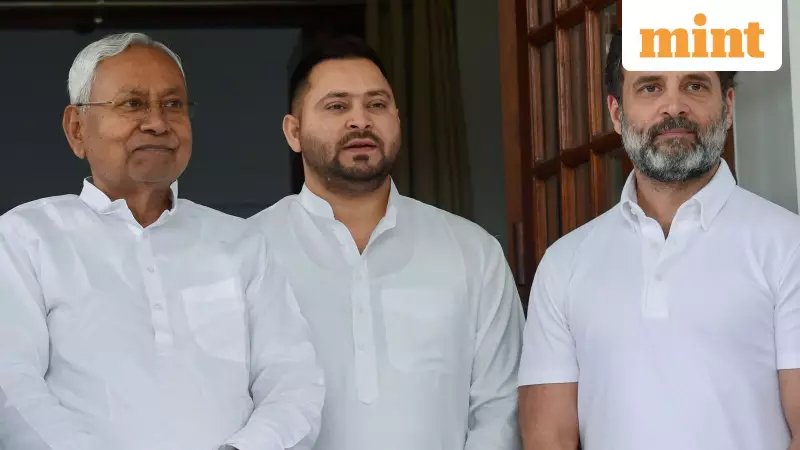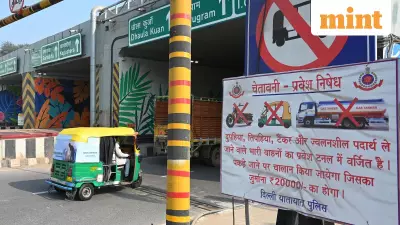
Prime Minister Narendra Modi launched the ambitious Mukhyamantri Mahila Rojgar Yojana on Friday, marking a significant pre-election announcement by transferring ₹10,000 each to the bank accounts of 75 lakh women across Bihar. This massive financial initiative comes as the state prepares for a crucial triangular contest in the Assembly Elections held earlier in November.
Political Battle Intensifies with Competing Manifestos
The ruling National Democratic Alliance (NDA), led by the BJP and JD(U), has strategically avoided releasing a formal manifesto. However, Chief Minister Nitish Kumar has personally announced approximately 20 poll promises targeting women, youth, minorities, teachers, and various other sections of society in the months leading up to the elections.
In a counter-move, the opposition INDIA bloc, spearheaded by Congress and RJD, released their 'Ati Pichhda Nyay Sankalp' or 'Most Backward Justice Manifesto' earlier this week. Leader of Opposition in Lok Sabha Rahul Gandhi unveiled this 10-point resolution specifically designed to woo the Extremely Backward Class (EBC) community, which constitutes about 36% of Bihar's population.
INDIA Bloc's EBC-Focused Promises
The INDIA bloc's manifesto presents a comprehensive package for EBC communities, recognizing their crucial role in determining election outcomes. Historical data from Lokniti-CSDS shows that EBC voting patterns have significantly influenced past election results, with 45-50% supporting JD(U)-BJP in 2010 and around 55% backing the Mahagathbandhan in 2015.
The key promises include:
New legislation and enhanced reservation: The bloc promises to pass the 'Extremely Backward Atrocity Prevention Act' modeled on the SC/ST Act. They plan to increase reservation for EBCs in panchayats and urban local bodies from 20% to 30%.
Educational and economic empowerment: The manifesto guarantees 50% reservation for EBCs, SCs, STs, and Backward Castes in government contracts up to ₹25 crore. It also ensures half of the seats reserved under Right to Education Act in private schools will be designated for children from these communities.
Administrative reforms: The concept of "Not Found Suitable" (NFS) in appointment processes will be declared illegal, and a high-powered Reservation Regulatory Authority will be established to oversee reservation policies.
NDA's Comprehensive Development Package
Chief Minister Nitish Kumar's announcements cover a wide spectrum of society, demonstrating the NDA's attempt to create a broad-based support coalition.
Women and youth empowerment: Beyond the flagship women's employment scheme, the government has extended the Chief Minister's Nishchay Self-Help Allowance Scheme to include unemployed graduates from Arts, Science, and Commerce streams, providing ₹1,000 per month for up to two years.
Education reforms: In a significant move, education loans under the Student Credit Card Scheme will now be interest-free for all applicants. The repayment period has been extended from 5 to 7 years for loans up to ₹2 lakh and up to 10 years for larger amounts.
Social welfare enhancements: The government has substantially increased social security pensions from ₹400 to ₹1,100 per month for elderly, differently-abled individuals, and widowed women. Anganwadi workers will see their honorarium rise from ₹7,000 to ₹9,000, while helpers get an increase from ₹4,000 to ₹4,500.
Industrial development: The New Bihar Industrial Investment Promotion Package 2025 offers attractive incentives including interest subvention up to ₹40 crore and capital subsidy of 30% for setting up industries. Large industrial units creating substantial employment will receive free land allocation.
Election Implications and Voter Impact
The competing promises reveal the strategic priorities of both alliances. The NDA has opted for a wide-ranging approach, addressing multiple voter segments simultaneously. The INDIA bloc, meanwhile, has chosen to focus intensely on the EBC community, historically considered Nitish Kumar's stronghold but showing shifting allegiance patterns in recent elections.
With the polls predicted to be a tight contest between NDA, INDIA bloc, and Prashant Kishor's Jan Suraaj Party, these announcements could play a decisive role in influencing voter sentiment. The substantial financial commitments and policy overhauls proposed by both sides underscore the high stakes involved in Bihar's political landscape.
As election day approaches, the implementation feasibility and financial implications of these promises are likely to become central points of debate, with voters carefully weighing the credibility and track record of each political formation in delivering on their commitments.





